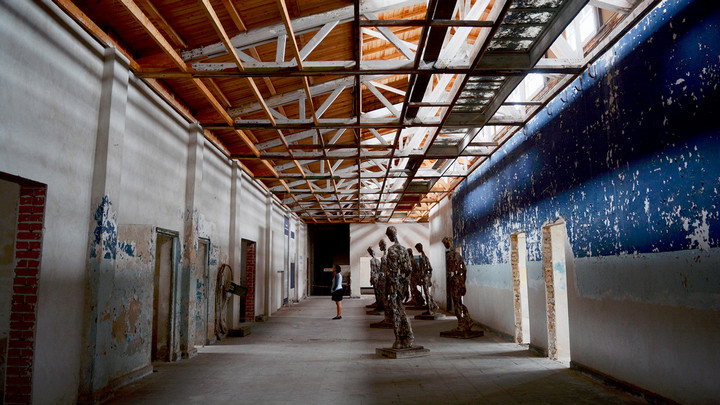I-witness field school

The I-witness field school explores Holocaust memorialization in Central Europe.
In this 3.0-unit, 400-level course, you'll build an understanding of antisemitism, racism, religious intolerance, homophobia and ableism by visiting historical sites, museums and monuments across Central Europe. Students will observe how the Holocaust is memorialized today, exploring how memorialization changes over time and place.
Structure
Participants will register for the May–August term. The course consists of 1 week of intensive study at the University of Victoria, followed by 3 weeks in Central Europe, including:
- Berlin (Germany) and surrounding areas
- Kraków (Poland)
- Vienna & Linz (Austria)
Information sessions
Want to find out more about the field school? Please attend one of the following information sessions to get more details.
| Date | Start time | End time | Room |
|---|---|---|---|
| Thursday, Oct. 9, 2025 | 10:00am | 11:00am | Zoom* |
*If you are interested in attending the October 9th info session on zoom, please email iwitness@uvic.ca for the zoom link.
Registration
Before applying, we recommend attending an information session. All registration materials should be sent to the program director.
- statement of purpose: summarize why you want to participate in the field school (max. 2 pages with heading "statement of purpose")
- what do you hope to gain from participating?
- what can you contribute to the group and the program as a whole?
- demonstrate the connection between the field school and your previous and future academic work, including, if relevant, your background in Holocaust and multicultural education (e.g., coursework, extra-curricular activities, etc.)
- unofficial transcript(s) of courses taken from all post-secondary institutions attended
- 1 letter of recommendation from a university instructor:
- the instructor who is writing a letter on your behalf should email us the recommendation separately
- completed registration form
We will also hold short interviews with applicants. You can sign up for an interview slot in the main office of the School of Languages, Linguistics and Cultures (Clearihue C247).
Applications will open for the 2026 field school in September 2025. The deadline for submitting an application is November 1, 2025. Please sign up for an interview before the deadline.
Costs
The total program cost is $3000 (subject to change). All program costs are in CAD.
We have greatly reduced actual program costs for students through donations, and we are continuing to gather donations in order to reduce costs even further.
Included in the program cost:
- 23 nights accommodation in a centrally located, tourist class hotel or hostel based on multi-bedded rooms with private or shared facilities
- continental breakfast daily
- intra-European flights, train and intra-European coach travel
- program director, who also serves as instructor and adviser
- field school travel facilitator and assistant
- local guides at the sites of former concentration camps
- final farewell dinner
Additional costs:
- tuition
- round-trip transatlantic airfare
- travel and health insurance
- all meals except breakfast
Deposit and payment schedule
- Nov. 15: $500 deposit due
- Feb. 1: $1250 due
- March 1: $1250 due
Cancellation policy
If you have to cancel your participation in the field school, please get in touch as soon as possible so we can work on a solution.
The following cancellation fees apply:
- Cancellation before Feb. 8: $500 deposit
- Cancellation between Feb. 8 and March 8: $500 deposit plus $1000 fee
- Cancellation between March 8 and May 8: full program costs
Funding
The Experiential Learning Fund in the Faculty of Humanities provides additional funding to students who have little or no available funding support. Interested students should send the Faculty of Humanities' Administrative Assistant Lindsay Mair (lindsaymair@uvic.ca) an email specifying the following:
- Name
- Student Number
- Home Faculty and Declared Program(s)
- Level (UG/G) and Year of Study
- Have you already received an award or other funding to support this field school? Y/N
- Brief statement indicating any special circumstances (e.g. financial, caregiving, circumstantial, etc.) that could assist the committee in making their decision.
One or more awards are given to undergraduate students to assist with the travel costs of the I-witness Field School (travel to, from and within Europe). Students must submit a statement of no more than 500 words to Germanic and Slavic Studies by March 1 describing their reasons for wanting to participate in the Field School and what they hope to learn from the experience. The students will be selected by the Director of the I-witness Field School. Approval of the recipient(s) will be made by the Senate Committee on Awards upon the recommendation of the Germanic and Slavic Studies program in the School of Language, Linguistics and Culture.
Three awards of $1,800 each are given to undergraduate students to assist with the travel costs of the I-witness Field School (travel to, from and within Europe) who have demonstrated financial need and who would otherwise not be able to attend the School.
Approval of the recipients will be made by the Senate Committee on Awards upon the recommendation of the Germanic and Slavic Studies program in the School of Languages, Linguistics and Cultures.
Students must apply for the Budvitch via the online application which is open every year from January 1 to January 31.
